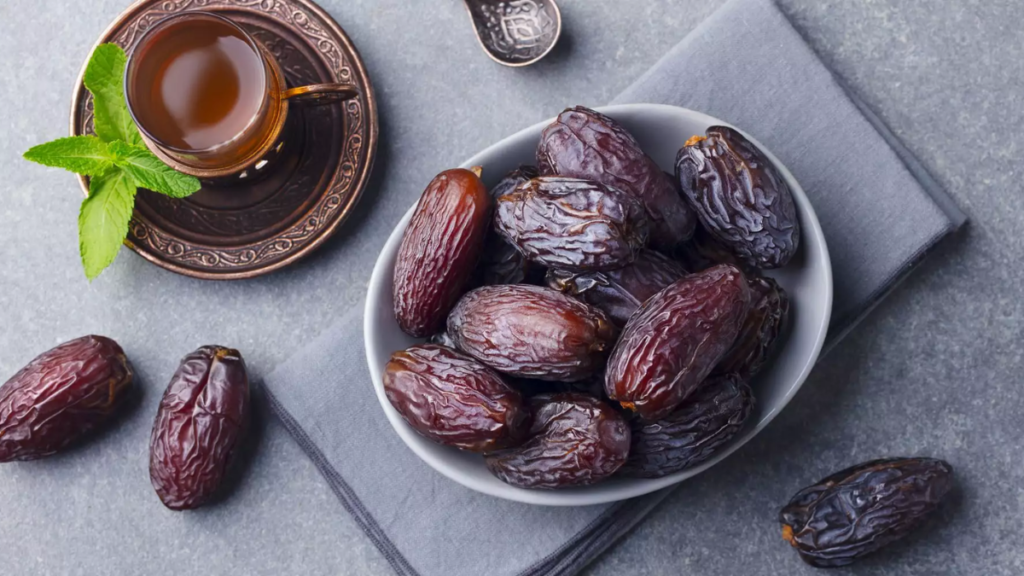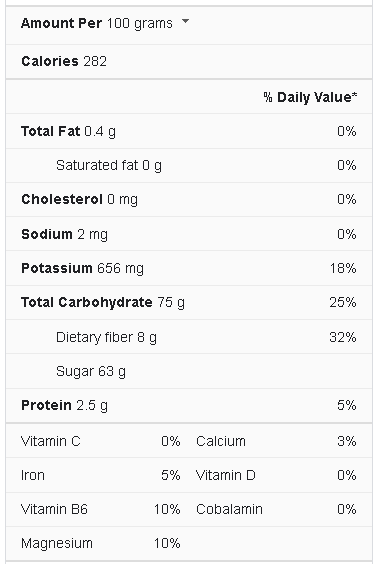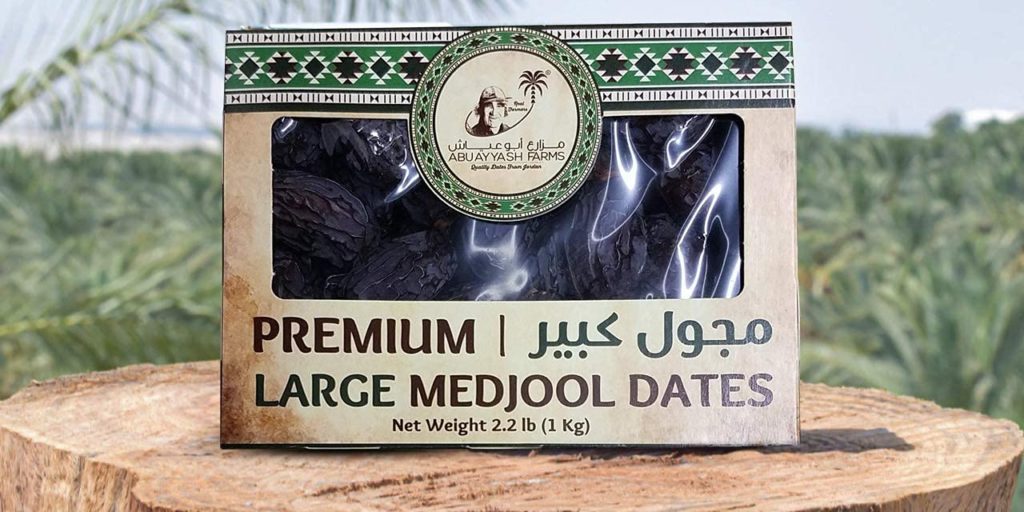Dates are one of the sweetest fruits on the planet. You might be wondering if dates are a healthy snack because of their high sugar content. Dates are naturally delicious, but they also include essential minerals and fiber as a fruit. Dates should be consumed in moderation, although far from calorie-free food. A 100g date contains 282 calories, 2.5g protein, 75g carbs, and 0.4g fat. Potassium, magnesium, and iron are all abundant in dates.
Potassium, magnesium, and iron are all abundant in dates. Dates also include six B vitamins, including folate and pantothenic acid, needed for good health. Dates also contain many polyphenols, antioxidants protecting cells from harm, and helpful phytoestrogens.
Dates Nutrition Facts
What is Exactly A Date?
Dates are a fruit produced by the date palm tree, native to the Middle East but is currently grown in the Mediterranean, Asia, the United States, and Mexico. Large clusters of dates hanging from the tops of these palm trees. The skins become dark and wrinkled as moisture evaporates as the fruit ripens. They are generally collected by hand at this time, either by climbing up the palm or using a mechanical lift.
They resemble a vast shriveled raisin when harvested. Despite their look, they still have moisture in them. Dates with a stone in the middle should be removed before eating, or pitted dates can be purchased. Fresh and dried dates are available all year, although fresh dates are most acceptable in November and January. There are many various types of dates, but the Medjool date is one of the most well-known since it has a sweeter and stickier flavor and texture than others.
What are the Health Benefits of Dates?
Dates’ micronutrients and plant components have been linked to several possible health advantages.
Protects Against Cancer
Dates have anti-inflammatory and antioxidant qualities that have been linked to cancer prevention. After testing it, researchers discovered that date extract has outstanding free-radical scavenging capabilities and antitumoral efficacy.
Supports Heart Health
Potassium, an essential electrolyte for the cardiovascular system, is found in dates. Potassium is well-known for its ability to lower blood pressure. Dates are also low in salt and have a high fiber content. Date consumption for heart health is supported by all three of these considerations.
Promotes Strong Bones
Magnesium is found in dates and is necessary for bone development. A lack of magnesium has been linked to an increased risk of osteoporosis. It is preferable to get magnesium from food rather than supplements because it decreases the danger of toxicity. Furthermore, the iron in dates aids in the maintenance of healthy bone marrow storage.
May Reduce Menopausal Symptoms
Isoflavones, which are usually associated with soy products, are a form of phytoestrogen that aids in the reduction of menopausal symptoms. Dates have the highest content of isoflavones among fruits. As a result, dates are being researched to see if they can help with menopausal symptoms naturally.
Helps Stabilize Blood Sugars
A modest number of dates can go a long way. Dates can be used in place of intense sweeteners like syrups and refined sugars to add sweetness without causing blood sugar levels to surge. Dates are also a handy, portable snack that might help with low blood sugar symptoms.
How Many Dates Should Be Eaten Per Day?
To receive all of the essential nutrients, eat 100 g of dates or a handful of dates per day, though the amount ingested will vary from person to person depending on calorie needs and underlying health issues. You can see a nutritionist to determine how many dates you should consume each day. Dates are the best source of antioxidants and minerals, and vitamins. Dates are also high in selenium, a trace mineral that may reduce the risk of bladder and prostate cancer.
Varieties of Dates
Dates, which are the fruits of the date palm tree, have been grown since prehistoric times, possibly as early as 8,000 years ago. Date palm trees come in over 100 different types and are native to the Middle East. Dates are hung in significant clusters above the tall palm trees and come in various textures, from complex, dry species to semi-dry types like Deglet Noor dates and significant, soft dates like Medjool dates (aka “the queen of dates”). Medjool dates are a popular kind at grocery stores in the United States, and they are typically significantly more significant than other dates (with one pitted Medjool date averaging 24g).
Dates are fresh fruits, despite their appearance of being dried. Fresh, whole dates are one of nature’s only naturally “dried fruits,” containing only 30% moisture. Many dates are left on the palm tree until they are entirely ripe to extend their shelf life. These dates, available at many specialty grocery stores, are slightly dry before being harvested, but they are still considered fresh. Whole, chopped, or extruded pitted dates are available. Extruded dates are covered with oat flour, rice flour, or dextrose for baking. Date juice is also available, used in baking or smoothies.
How to Store Dates?
Dates should be plump, shiny, and wet to the touch. They should not be broken, cracked, dried, hard, or faded, even if they are somewhat wrinkled. They have a deep flavor and a sticky-sweet, almost candied texture. Soft and semi-soft kinds, such as Deglet Noor, should be kept in the refrigerator for 18 months for the best shelf life. Store for up to a year at room temperature.
To prevent mold formation, dried packaging dates are pasteurized. You can keep them for about six months at room temperature in an airtight container in a cold, dry place, and they can also be stored in the refrigerator for up to a year. Although packaged dates, both pitted and unpitted, are accessible all year, fresh dates are only available from mid-August to mid-March in the United States.
Dates Medjool AbuAyyash Farms
Features:
- Medjool dates are grown in the deepest valley in the world; Medjool dates have a unique and distinctive taste unmatched by any grown elsewhere .our Medjool are handpicked at the perfect timing of the ripening stage to ensure our dates are resilient and can withstand a long shelf life. Jordan Medjool Dates are high in sugar, but these sugars are sucralose, fructose, and glucose that our body can efficiently process and utilize, giving us a natural boost in energy.
- Regularly eating Jordan Medjool dates is beneficial and nutritious. It contains insoluble and soluble fibers, and it is suitable for a healthy diet: vegetarian, delicious Medjool dates are suitable for many types of healthy diets.
- Wonderfully high in Calcium and Iron, Blend them into smoothies, roll them into bliss balls or take them to work for a healthy, mid-day snack; Jordan Medjool is meaty, sweet, and delicious.
What are the Side Effects of Eating Dates?
Potential side effects of consuming dates include:
Weight gain
When consumed in excess, dates can lead to weight gain due to their high caloric content. So, it is essential to consume dates in moderation.
Blood sugar
Since dates contain natural sugars, eating them in excess can increase blood sugar levels.
Kidney disease
Individuals with kidney disease should follow caution while having dates. Consult a doctor regarding the amount of potassium to be taken every day.
Allergies
Dried dates often contain sulfites that may trigger allergies in some. Monitor for these symptoms after having dried dates:
- Stomach pain
- Bloating
- Diarrhea
- Skin rash
Asthma
Sulfites can exaggerate the symptoms of wheezing in people with asthma
Conclusion
Dates are delicious and nutritious fruit to include in your diet. They’re high in minerals, fiber, and antioxidants, which can help with everything from digestion to illness prevention. Dates can be consumed in a variety of ways. They’re commonly used as a natural sweetener in various cuisine and delicious as a snack. Dates are easiest to come by in dried form, but they should be consumed in moderation because they are higher in calories than fresh fruit. Dates are a great addition to any diet because they are nutritious and delicious.





